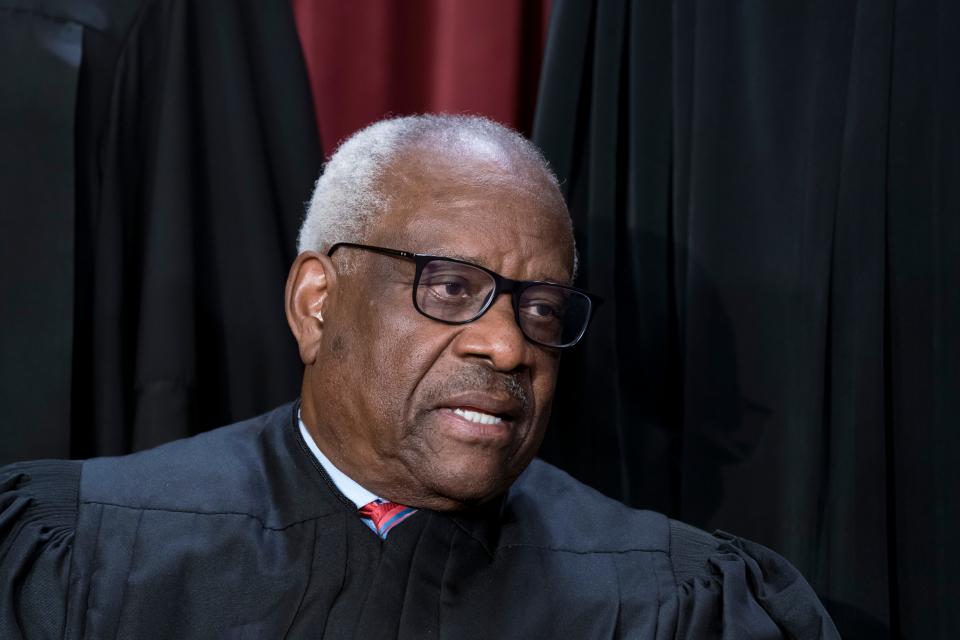Clarence Thomas could ruin the Supreme Court's credibility. Don't let that happen
- Oops!Something went wrong.Please try again later.
- Oops!Something went wrong.Please try again later.
Why does the highest court in the nation have the lowest ethical standards?
Upon the latest revelation of unreported gifts, U.S. Supreme Court Justice Clarence Thomas contends that he doesn’t have to disclose his acceptance of luxury trips from a GOP megadonor.
His explanation is that the gifts came from a close family friend he has known for many years and that colleagues he had consulted advised him he needn’t divulge the connection.
More recently it was reported by ProPublica that in 2014, the megadonor also purchased the home where Thomas’ elderly mother lived and continues to live and made significant improvements on the property.
Justice Thomas himself owned a one-third interest in the house, the investigative piece showed.
Some rules don't apply to Supreme Court
Justice Thomas’ benefactor, Harlan Crow, is a Texas billionaire with a partisan political agenda. For many years, Crow has contributed to right-wing candidates running for public office and to political action committees supporting right-wing agendas.
He makes no secret of his politics or his donations.
Thomas’ case lays bare the shortcomings of rules and ethics designed to protect the integrity of public institutions — ones that apply to everyone except Supreme Court justices.
Federal law, for instance, prohibits officers of the judicial branch “from accepting gifts from people whom they could use their job to benefit.”
The law, unhelpfully, doesn’t define which gifts qualify.
Lower court federal judges are required to follow the policies promulgated by the Judicial Conference of the United States, a governmental body created in 1922 to develop administrative and policy issues affecting the federal court system.
New regulations require more disclosure

In declining to appear before Congress, Supreme Court Chief Justice John Roberts wrote in a letter, “All Members of the Court do in fact consult the Code of Conduct in assessing their ethical obligations.”
Yet, the Judicial Conference has no authority over the Supreme Court, only the lower federal courts.
In fact, its gift policy specifically states that it does not cover justices or employees of the Supreme Court. Nor does the Supreme Court have an ethics office, unlike other federal agencies which each has its own to enforce the law and impose penalties.
Nonetheless, Supreme Court justices are required to file annual financial disclosure statements pursuant to the Ethics and Government Act of 1978. The law excluded reporting “personal hospitality” of food, lodging or entertainment received.
And in mid-March, new regulations went into effect that strengthened financial disclosure requirements regarding gifts and free travel and hotel stays.
A committee of the Judicial Conference approved the new regulations, bringing more transparency to justices who travel, dine or vacation for free at the private resort of a wealthy executive.
Arizona's requirements are more stringent
In Arizona, every elected official from constable to governor, including state judges, is required to file a financial disclosure statement at the beginning of each year. The document requires disclosure of:
the members of the family;
sources of income for family members, debts, investments, real property ownership; and
gifts of a value over $500 received, including by members of the family from someone other than a family member.
The purpose is to disclose any ties the elected official might have that could demonstrate a bias or the appearance of a bias on any issue connected to the information contained in the document.
Rep. Harris lied: She should face punishment, ethics panel says
If there are personal ties to any issue coming before the elected official in the course of his professional duties, then he should recuse himself from hearing that issue or refrain from voting on it.
The purpose of this process is to be transparent given that elected officials, including judges who are appointed, are public servants. The integrity of our leaders is important to the public trust and confidence in its institutions.
Thomas' actions undermine court's credibility
Likewise, each time a public servant violates or compromises his integrity, it serves to erode the credibility of our institutions. In the case of the justices, the independence of the judiciary is at stake, as well.
So it is with Justice Thomas and his case’s potential impact on the Supreme Court.
It’s particularly disturbing that his wife, Virginia Thomas, is a conservative political activist and was found to have communicated with President Trump’s team in the run-up and the day of the Jan. 6 insurrection at the U.S. Capitol.
Yet, the justice did not recuse himself from participating in discussions and issuing decisions regarding the numerous issues dealing with the insurrection or former President Trump.
Even if Thomas has never been influenced in his legal decisions by the gifts he has accepted from Harlan Crow, and Thomas’ wife did nothing wrong relating to the insurrection, the appearance of impropriety exists.
And that casts just as dark a shadow on the independence of the judiciary as an actual ethical violation committed with intention.
If every other judge, federal or state, must disclose such gifts, why isn’t the same required of a justice sitting on the highest court in the land, with a lifetime appointment?
To withhold disclosure by a justice comes across as a sinister and alarming act. More disturbingly, it risks undermining the credibility of our United States Supreme Court.
Barbara Rodriguez Mundell served as a judge in Maricopa County Superior Court for 19 years and was the court’s presiding judge from 2005-2010. She is a member of the Board of Contributors for The Arizona Republic. Reach her at barbaramundell@gmail.com.
This article originally appeared on Arizona Republic: Clarence Thomas' gifts ruin the US Supreme Court's credibility

